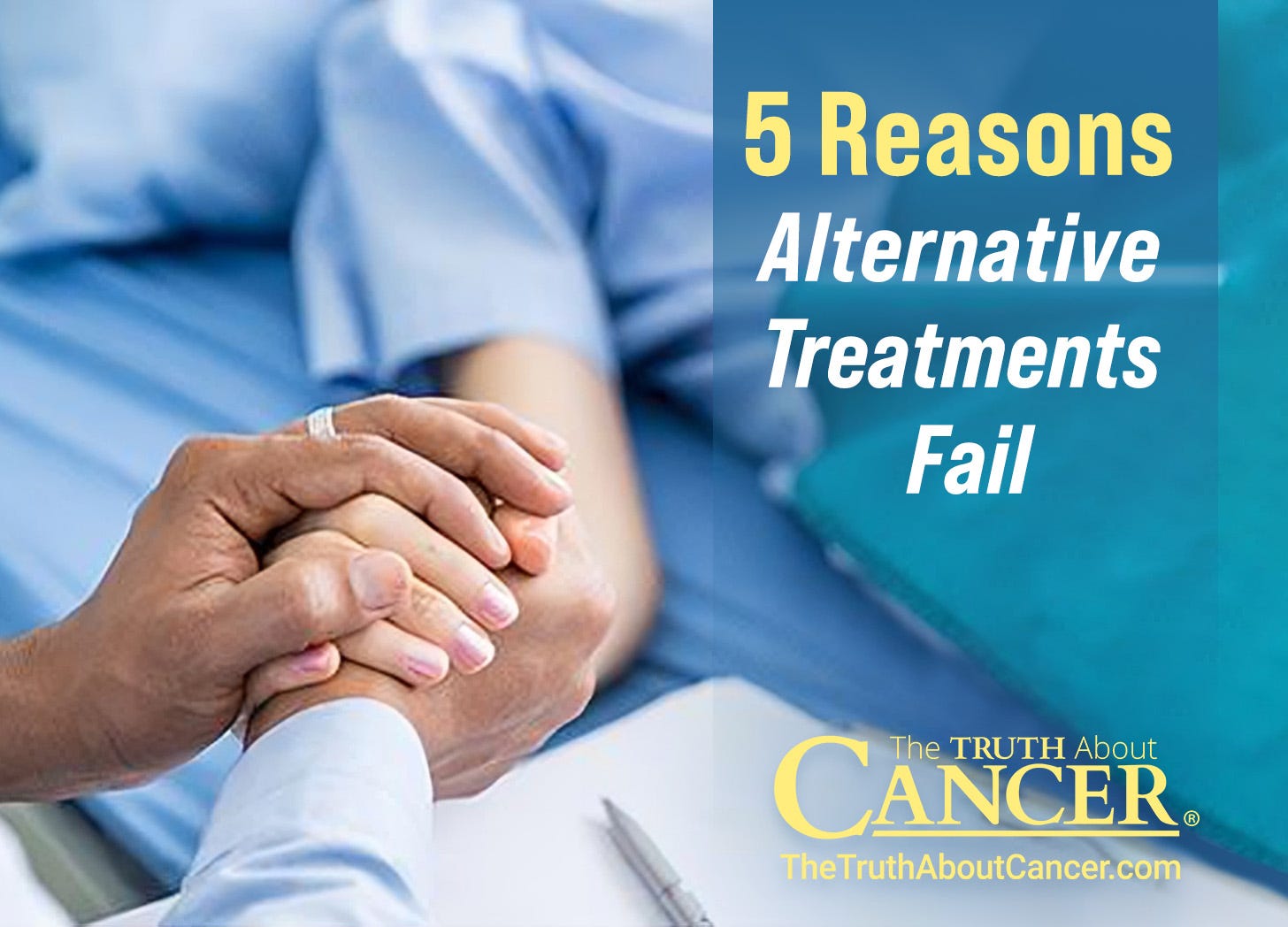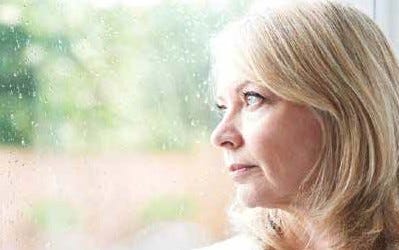5 Reasons Alternative Treatments Fail
Proponents of conventional (allopathic) cancer treatments will often argue that natural or alternative cancer treatments are not always successful. Which is true, of course. They’re not always successful in healing the patient from cancer. Of course, neither is chemo, radiation, or surgery – as has been discussed many times on The Truth About Cancer.
What many people refer to as “alternative treatments,” however, are often little more than someone trying a few non-mainstream therapies without really adopting a good natural or alternative treatment plan (which we will simply call “alternative treatment” hereafter).
When alternative treatment fails, it is most often due to one or more of the following five reasons:
Not picking the right plan to begin with
Waiting until it is too late to begin using alternative treatments
Failure to stick with one treatment plan
Not following a treatment plan completely/properly
Discontinuing a treatment
In this article, we will examine each of these five common reasons alternative treatments are not successful. We’ll also explore the case for using alternative cancer treatments and steps to help ensure that alternative treatments do not fail.
Reason #1 | Not Picking a Good Alternative Treatment Plan
First off, let me reiterate that trying one or a few alternative items is NOT using an alternative plan to try to defeat cancer. For the most part, that is little more than haphazardly throwing a few supplemental items at the cancer in the hopes that they might somehow work. It saddens me to no end to see mainstream proponents almost gleefully proclaim how alternative cancer treatments “failed” when someone tries such an approach. In such instances there was really no failure on the part of alternative cancer treatments – rather there was a failure to ever adopt a true alternative plan to begin with.
A second problem which occurs far too frequently is when people with cancer fall for what I call “one trick ponies” and adopt a product or plan based upon hype and/or cancer discussion board legends. Some examples include:
Using Laetrile by Itself
For a time, laetrile was very popular as a cancer treatment thanks in large part to two reasons: One was the publication of the book by G. Edward Griffin A World Without Cancer which touted laetrile as pretty much THE solution to cancer. Another reason was the much publicized firing of Dr. Ralph Moss from his position as publicist for Sloan-Memorial Kettering Hospital. As shared in the June 2017 issue of the Heroes Against Cancer newsletter, Moss was fired after he outed the hospital for covering up the results of a laetrile study conducted by one of their own doctors.
Although laetrile is very beneficial for preventing cancer and as part of an overall anti-cancer protocol, it should not be used as a standalone treatment for cancer. When you delve into laetrile success stories (as this author has done) you will almost invariably find that the people who used laetrile also used other supplemental items as well as adopted healthier diets and lifestyles.
Relying Exclusively on Supplemental Oxygen
Though both of these can indeed be helpful, they are not generally good standalone treatments for cancer. Their popularity is due in great part to misleading information that Dr. Otto Warburg won a Nobel Prize for discovering that cancer was caused by low oxygen and acidic pH and that it cannot survive in an alkaline or highly-oxygenated environment. That is simply not true.
What Dr. Warburg won his Nobel Prize for was his discovery that cancer cells characteristically were low in oxygen content. Although that led him to initially hypothesize that cancer might be reversed by providing additional oxygen, when he tried to do so he was unsuccessful – and for good reason.
Don’t fall into the trap of using only one “miracle” alternative cancer treatment method you discover on the internet. It usually takes a multi-pronged approach to heal from cancer
Ignoring the Impact of Toxins
Mistakenly believing the false claims that cancer is, or is caused by, a fungus, a bacteria, a virus, parasites, or any other number of causes besides what is far and away the true number one cause of cancer in this author’s opinion: toxins in combination with unhealthy cellular terrain. All of those items may contribute to cancer – especially when they contribute to unhealthy cellular terrain – but it is toxins that are the number one culprit. This was explained well over a hundred years ago by the great French scientist Antoine Béchamp. It is worth noting that many of the natural items which are successful against fungi, viruses, bacteria, parasites and the like do have anti-cancer properties.
The theory of baking soda and molasses/maple syrup would have people believe that when baking soda is combined with molasses or maple syrup it “tricks” the cancer cells into gobbling up the mixture and thus introduces baking soda into the cancer cells where it is deadly for them. Anyone with a basic understanding of human digestion would know that the human digestive system breaks down all ingested items into their component compounds and that nothing as large as a combination of baking soda and molasses or maple syrup could possibly enter intact into the blood stream. As a slight caveat – some proponents believe that the molasses or maple syrup somehow potentiates the ability of the cancer cells to take in baking soda. Others note that both molasses and maple syrup contain a number of important compounds which may fight against cancer and boost the immune system.
(Later in this article, we will discuss how to ensure you choose the right cancer treatment plan.)
Reason #2 | Waiting Until It Is Too Late to Begin Alternative Treatments
Most people do not turn to alternative cancer treatments until they have been told by their oncologist that there is nothing more that mainstream medicine can do for them. Compounding this problem is that doctors frequently hang on to their patients long after it has become apparent that conventional treatments are failing.
Many cancer patients are given chemo and radiation treatments at end of life, subjecting them to pointless pain and suffering
Terminal cancer patients are often given harsh chemotherapy drugs and radiation treatments long after their oncologists have determined that curing their cancer is hopeless. In many instances such treatments continue up until the moment of death – or until the time that insurance and family savings are exhausted. As a result, many cancer patients are cruelly subjected to needless expense and suffering while little time and resources are left for alternative treatments that might otherwise have extended their lives.
A study published in the journal Cancer in 2010 found that radiation treatments were given to 91% of dying cancer patients. Half of the patients spent more than 60% of their remaining lives undergoing radiation treatments. Most died before they were able to complete their treatments. The study also found that instead of reducing pain, the treatments most often actually increased pain.
The Oncologist reported in 2009 that about one in five dying cancer patients were given chemotherapy within 14 days of their deaths. The report also stated that one-third of terminal cancer patients are not sent to a hospice until they had less than three days left to live. During that same time, Virginia Commonwealth Massey reported that 25% of Medicare expenses for terminal cancer patients were spent in their final month.
Thus, cancer patients often have scant weeks or even days to live when they turn to alternative treatments. Amazingly, sometimes the best alternative treatments are successful – but often they are not. Besides the short time the patient has left to live, their immune systems and major organs have been badly damaged by their harsh allopathic treatments. Plus, since mainstream cancer treatments usually only destroy the least resistant cancer cells, the remaining cancer is made up of cells which are most resistant to any treatment – alternative or mainstream.
Reason #3 | Failure to Ever Stick With One Treatment Plan
Cancer often causes lots of stress and anxiety – which is understandable since the patient’s very life is usually at stake. Sometimes this leads to cancer patients having little patience with treatments they try, and it is not unusual to see them hop from one treatment or supplement to another, never giving anything enough time to be effective.
Alternative treatments often take time to be successful. Certainly no one should be expected to stick with a treatment modality which is not working, but it should be given enough time to make sure that it isn’t. Of course, the earlier a person opts for alternative treatments, the more time they will have to try an approach and then switch if need be.
A cancer diagnosis causes stress and anxiety about doing the right things. But you need to give a treatment plan enough time to evaluate if it’s working
Think of your cancer as an invading enemy army (cancer cells) which has gained a foothold in your territory (your body). Once you begin to employ your anti-cancer resources it will likely take time to first slow down the advancing enemy, fight it to a standstill, and then begin to gain the upper hand and defeat it. The late Dr. Marc Swanepoel shared this timeline regarding his own highly successful anti-cancer protocol:
The normal situation is the following:
The rate of growth of the tumor/s slows down (after 3-6 weeks)
The cancer stabilizes (after 6-10 weeks)
The tumor starts to reduce in size (10-16 weeks)
Patient in remission (8-12 months)
Here it must be noted that sometimes there is only a slow decrease in size due to the fact that the bulk of the cells inside the tumor may be normal cells. So, even if all the tumor cells die, then the remainder of the normal cells will retain their size. The tumor(s) may then become hard (encrusted) and may take a long time, even years, to be reabsorbed by the body.
Remember, it is the RATE OF GROWTH that will initially slow down even if there is still some growth.
Reason #4 | Not Following a Treatment Plan Completely/Properly
The very best alternative treatments are comprehensive ones. In general, their components are not optional where you can pick and choose only the ones you want to follow. The different components are all there for a reason, and you are short-changing yourself if you don’t follow all of them.
Make sure you’re following all the components of your alternative treatment plan and not leaving out important steps
Take supplements for example, and note that word “supplements.” They are not called medicine for more than just the reason that the FDA would frown greatly on such a practice. They are supplemental items which you must work with in order to achieve success; not simply items you can throw at cancer or any other condition. That is how mainstream drugs are frequently used and it is worth noting that those drugs cure almost nothing and instead merely manage symptoms.
Turning cancer into a chronic condition which is not cured but is managed by chemotherapy drugs and radiation appears to be the goal of mainstream medicine. It is a goal that most often leads to suffering and an untimely death.
Reason #5 | Discontinuing a Treatment Before It has Been Completely Successful
One of the most disheartening things I have experienced in my years of helping people with cancer is when people believe that they have gotten the upper hand on their cancer and they slack off the protocol which had been successful for them – only to see cancer come roaring back with a vengeance.
When you believe you have gotten the upper hand against cancer is NOT the time to slack off, and neither is it time to pull back your efforts when you have been given a “cancer-free” diagnosis. Rather this is the time to bear down and make sure that cancer and its root causes have been completely eliminated. You need to ensure that cancer will not return or that it is not still lurking in your body waiting on the opportunity to have another battle – often with circulating tumor cells and circulating stem cells which are the most difficult to eliminate.
The Case for Using Natural Alternatives
Simply stated, the triumvirate of mainstream cancer treatments (surgery, chemo, radiation) seldom work. Surgery rarely removes all of the cancer cells. Chemo and radiation not only DON’T cure cancer, they actually make it more malignant while weakening the body’s major organs and destroying your natural first line of defense against cancer and other illness – your immune system. None of these three treatments address the root cause(s) which enabled cancer to gain a foothold in the first place. Without eliminating the root cause cancer is much more likely to return.
Chemotherapy and radiation first kill off the easiest cancer cells, leaving intact the cancer stem cells which are the most resistant to treatment. Thus as time and additional treatments go by, the remaining cancer cells are increasingly made up of the hardest ones to eliminate and it is those cells which multiply and grow. The news gets even worse…
Recent year studies have found that both radiation and chemo actually create deadly cancer stem cells which are 30 times more difficult to defeat than even the most difficult normal cancer cells.
What You Can Do to Ensure Your Alternative Cancer Treatment Is Successful
A comprehensive alternative treatment plan will include physical activity and getting out in sunshine
The very best natural and alternative cancer protocols are ones which address every area which may contribute to cancer as well as prevent it from being cured. Here are 8 tips for creating a successful cancer treatment protocol:
1 | Eliminate and avoid toxins which are far and away the number one cause of cancer
2 | Ensure you have a healthy liver, including open and freely flowing bile ducts to help eliminate toxins
3 | Make sure that you have optimum nutrition and address any nutritional deficiencies
4 | Include a very healthy diet which incorporates the best cancer-fighting foods
5 | Require exposure to plenty of sunshine and vitamin D3
6 | Help you manage stress and address unresolved emotional issues
7 | Call for regular physical activity
8 | Include key anti-cancer supplements










